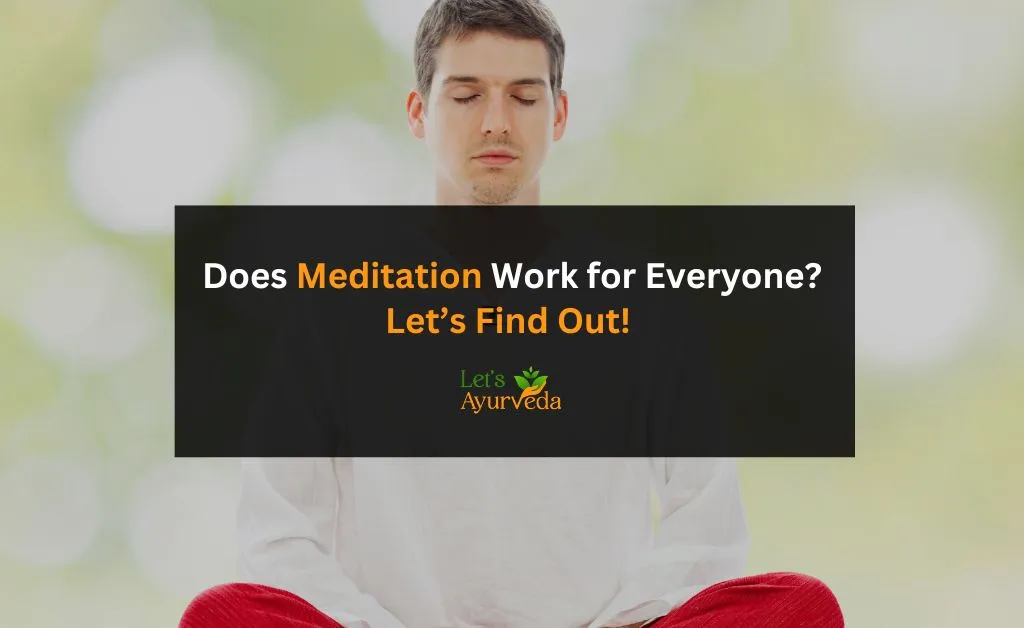Have you ever heard someone say, “Meditation changed my life!”? Maybe you’ve seen videos or read articles about how meditation helps people feel calm, focused, and happy. But you might be wondering, does meditation work for everyone? Let’s explore this question together in a simple and fun way!
What Is Meditation?
First, let’s talk about what meditation actually is. Meditation is a way to train your mind to focus and relax. It’s like exercise for your brain! Some people sit quietly, close their eyes, and focus on their breathing. Others might listen to calming sounds or repeat a word or phrase in their mind. There are many ways to meditate, and it’s all about finding what works best for you.
Meditation has been around for thousands of years. It started in ancient cultures and has been used by people all over the world. Today, it’s become really popular because it’s a simple way to help people feel better, both mentally and physically.
Why Do People Meditate?
People meditate for different reasons. Some do it to feel less stressed, while others want to sleep better or improve their concentration. Meditation can also help you feel more connected to yourself and the world around you. It’s like giving your mind a little break from all the noise and busyness of everyday life.
Here are some common reasons why people meditate:
-
To Reduce Stress
Life can be stressful, whether it’s school, work, or just dealing with everyday problems. Meditation helps calm the mind and body, making it easier to handle stress. -
To Improve Focus
If you find it hard to concentrate, meditation can help train your brain to stay focused on one thing at a time. -
To Sleep Better
Some people have trouble falling asleep because their minds are racing. Meditation can help you relax and get better sleep. -
To Feel Happier
Meditation can help you feel more positive and grateful for the good things in your life. -
To Understand Yourself Better
When you meditate, you spend time with your thoughts and feelings. This can help you understand yourself better and make better decisions.
Does Meditation Work for Everyone?
Now, let’s get to the big question: Does meditation work for everyone? The short answer is: not always in the same way. Meditation can be helpful for many people, but it might not feel right for everyone. Here’s why:
1. Different Strokes for Different Folks
Just like some people love running while others prefer yoga, meditation might feel great for some but not for others. It’s all about personal preference. Some people find it easy to sit still and focus, while others might feel restless or bored. For example, if you’re someone who loves being active, sitting still for a long time might feel uncomfortable. That’s okay! There are other ways to relax and take care of your mind.
2. It Takes Practice
Meditation isn’t always easy at first. If you try it once and don’t feel anything, that’s okay! It’s like learning to ride a bike—it takes time and practice. The more you do it, the better you might get at it. At first, your mind might wander a lot, and that’s completely normal. The key is to be patient with yourself and keep trying.
3. It’s Not a Magic Fix
Meditation can help with stress and focus, but it’s not a cure-all. If you’re dealing with big problems or feelings, it’s important to talk to someone you trust, like a parent, teacher, or counselor. Meditation can be a helpful tool, but it’s not the only solution. For example, if you’re feeling really sad or anxious, meditation might help a little, but it’s also important to get support from others.
4. Some People Might Not Like It
And that’s okay too! If you try meditation and it doesn’t feel right, there are other ways to relax and take care of your mind. You could try drawing, listening to music, going for a walk, or even just taking deep breaths. The goal is to find what works best for you.
How to Give Meditation a Try
If you’re curious about meditation, here’s a simple way to start:
-
Find a Quiet Spot
Choose a place where you won’t be disturbed. It could be your bedroom, a park, or even a cozy corner in your house. -
Get Comfortable
Sit or lie down in a comfortable position. You don’t have to sit cross-legged if it’s not comfortable for you. The key is to feel relaxed. -
Close Your Eyes and Breathe
Close your eyes and take a few deep breaths. Focus on how it feels to breathe in and out. You can count your breaths if that helps you stay focused. -
Notice Your Thoughts
If your mind starts to wander (and it will—that’s normal!), gently bring your focus back to your breath. Don’t get frustrated if this happens. It’s all part of the process. -
Start Small
Begin with just 1-2 minutes and see how it feels. As you get more comfortable, you can try meditating for longer periods of time. -
Try Different Types of Meditation
If sitting still and focusing on your breath doesn’t work for you, there are other types of meditation you can try. For example:-
Guided Meditation: Listen to a recording or an app that guides you through the meditation.
-
Movement Meditation: Try walking slowly and focusing on each step you take.
-
Visualization: Imagine a peaceful place, like a beach or a forest, and focus on the details.
-
What If Meditation Isn’t for You?
That’s totally fine! Meditation isn’t the only way to relax and take care of your mind. Here are some other activities you can try:
-
Journaling
Write down your thoughts and feelings in a journal. This can help you understand yourself better and let go of stress. -
Exercise
Physical activity, like running, dancing, or playing sports, can help you feel more relaxed and happy. -
Creative Activities
Drawing, painting, or playing music can be great ways to express yourself and relax. -
Spending Time in Nature
Go for a walk in the park, sit by a lake, or just spend time outside. Being in nature can help you feel calm and refreshed. -
Talking to Someone
Sometimes, the best way to feel better is to talk to someone you trust. Whether it’s a friend, family member, or counselor, sharing your feelings can make a big difference.
The Science Behind Meditation
You might be wondering, why does meditation work for some people? Scientists have studied meditation and found that it can have real benefits for the brain and body. Here are some cool facts:
-
It Changes Your Brain
Studies show that regular meditation can change the structure of your brain. It can increase the size of areas related to focus, memory, and emotions. -
It Reduces Stress Hormones
Meditation can lower the levels of cortisol, a hormone that’s linked to stress. This can help you feel calmer and more relaxed. -
It Improves Attention
Meditation can help you focus better and pay attention for longer periods of time. This can be especially helpful for school or work. -
It Boosts Your Mood
Meditation can increase the production of serotonin, a chemical in your brain that helps you feel happy.
Final Thoughts
So, does meditation work for everyone? Not exactly. But it’s worth a try if you’re curious! Even if it doesn’t become your favorite thing, you might learn something new about yourself. And if it does help you feel calmer or more focused, that’s a bonus!
The most important thing is to find what makes you feel good. Whether it’s meditation, drawing, playing sports, or something else, taking care of your mind is always a great idea. So, why not give meditation a shot? You might just discover a new way to relax and feel your best!






